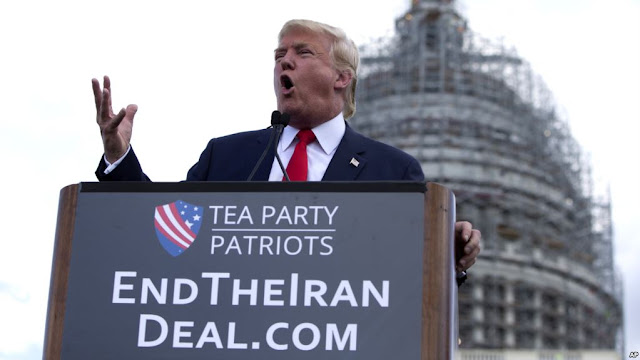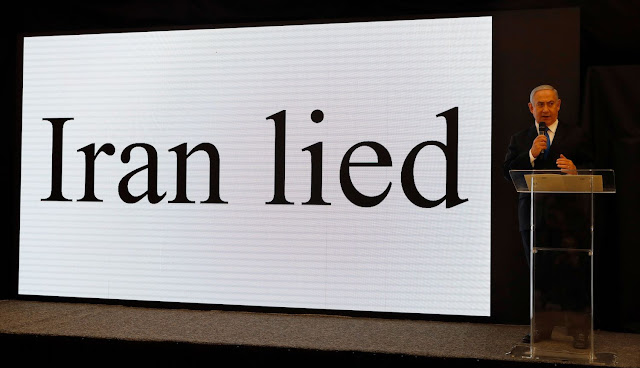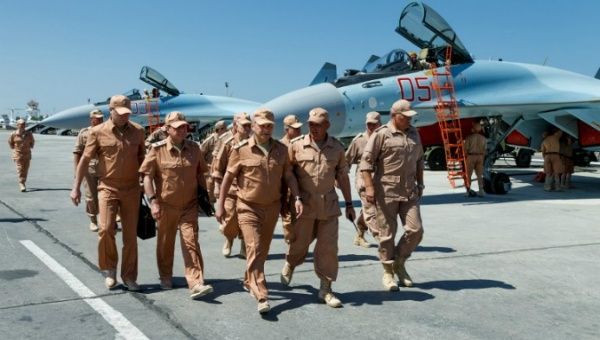America Planned to Break "Iran Nuclear Deal" Years Before Signing It
May 9, 2018May 9, 2018 (Tony Cartalucci - NEO) - The so-called "Iran Nuclear Deal," officially known as the Joint Comprehensive Plan of Action (JCPOA) signed on 2015 now under threat by a backtracking US - was billed at the time of its signing as a historic agreement that provided a path forward towards peace between the US and Iran.
The BBC in an October 2017 article titled, "Iran nuclear deal: Key details," would even go as far as claiming:
The 2015 nuclear deal struck between Iran and six world powers - the US, UK, Russia, France, China, and Germany - was the signature foreign policy achievement of Barack Obama's presidency.But while the agreement has been hailed as a "signature foreign policy achievement," it was, before even its inception - not a vehicle towards peace - but a cynical ploy to justify future war.
The initial framework lifted crippling economic sanctions on Iran in return for limitations to the country's controversial nuclear energy programme, which international powers feared Iran would use to create a nuclear weapon.
The United States had never intended to allow Iran to rise as a counterbalancing regional power in the Middle East or Central Asia nor escape from under the constant threat of US military intervention or the crippling sanctions it has targeted the nation with for decades.
The enduring presence of US military forces in Afghanistan transcending now three presidencies and nearly two decades was one of two bookends placed around the rise of Iran.
The other has been a war waged in the Middle East by the US and its allies against Iraq beginning in 2003 and spreading to Syria and Yemen by 2011.
Despite the numerous proxy wars Washington is waging against Tehran, US policymakers had determined years ago the necessity to justify a wider and more direct confrontation with Tehran itself.
A Conspiracy to Offer Then Sabotage an Iran Peace Deal is Stated US Policy
Far from conjecture, plans by US policymakers have been documented and are available freely to the public from among the various corporate-financier funded policy think tanks that produce US foreign and domestic policy.
Prominent among these is the Brookings Institution whose corporate-financier sponsors include arms manufacturers Boeing, Lockheed Martin, and Raytheon, energy giants Exxon Mobil, BP, Aramco, and Chevron, and financiers including Bank of America, Citi, and numerous advisers and trustees provided by Goldman Sachs.
In their 2009 paper, "Which Path to Persia?: Options for a New American Strategy Toward Iran" (PDF), Brookings policymakers would first admit the complications of US-led military aggression against Iran (emphasis added):
...any military operation against Iran will likely be very unpopular around the world and require the proper international context—both to ensure the logistical support the operation would require and to minimize the blowback from it.The paper then lays out how the US could appear to the world as a peacemaker and depict Iran's betrayal of a "very good deal" as the pretext for an otherwise reluctant US military response (emphasis added):
The best way to minimize international opprobrium and maximize support (however, grudging or covert) is to strike only when there is a widespread conviction that the Iranians were given but then rejected a superb offer—one so good that only a regime determined to acquire nuclear weapons and acquire them for the wrong reasons would turn it down. Under those circumstances, the United States (or Israel) could portray its operations as taken in sorrow, not anger, and at least some in the international community would conclude that the Iranians “brought it on themselves” by refusing a very good deal.And from 2009 onward, this is precisely what the United States set out to achieve. First with US President Barack Obama's signing of the 2015 JCPOA, up to and including current US President Donald Trump's attempts to backtrack from it based on fabricated claims Iran failed to honor the agreement.
America's Clumsy Warmongering
Perhaps unbeknownst to Brookings policymakers in 2009 was the eventuality of Western propaganda unraveling in the face of growing opposition in the form of both national and alternative media organizations.
Today, attempts to cite "chemical weapons attacks" and recycle 2003 "weapons of mass destruction" narratives to fan the flames of America's multiple and perpetual global conflicts are failing to persuade increasingly skeptical audiences.
The "game" - as Brookings policymakers called their attempts to covertly provoke war with Iran in their 2009 paper - they had hoped to hide from public view, is now exposed - dissected and displayed by independent analysts and national media organizations with unprecedented reach into global audiences once solely dominated by Western propaganda.
This has forced the West to proceed out in the open, with increasingly desperate public ploys to sell this exposed agenda.
During Israeli prime minister Benjamin Netanyahu's April 30th press conference regarding "evidence" that Iran was still pursuing a nuclear weapons program, his presentation had barely concluded before it was picked apart and exposed as little more than a poorly conceived charade designed to undermine the "Iran nuclear deal."
Prime Minister Netanyahu's presentation was so anemic that even Israel's Haaretz newspaper featured editorials with headlines like, "Netanyahu and His Lonely War on the Iran Nuclear Deal."
Yet despite the lack of public support, the momentum toward war with Iran is of titanic dimensions. It is a war that has been engineered for years, spanning multiple US presidencies. It involves peripheral conflicts including the wars in Afghanistan, Yemen, Iraq, and Syria used to stage US troops and equipment ahead of a future war with Iran itself.

The entire "Iran Nuclear Deal" was conceived, promoted, and then intentionally sabotaged at the cost of years of propaganda and public displays as well as both public and behind-the-scenes diplomatic maneuvering.
The supporting, arming, and training of Persian Gulf state armies in preparation for conflict with Iran has also been ongoing for years.
That the US currently lacks a legitimate pretext to not only betray the JCPOA, but to pursue further sanctions, provocations, and eventually war with Iran will not stop the US from trying - or having a sufficiently self-demonized Israel try on Washington's behalf.
Managing America's Dangerously Derailed Agenda
Israel's growing role in provoking both Iran and Syria is a signal of US desperation. Brookings and other analysts both for and against US aggression toward Iran note that Israel itself is incapable of toppling the governments residing in either Damascus or Tehran. Israel's role instead is to provoke a conflict and retaliation - or even stage what appears to be Syrian or Iranian retaliation - to then draw in the United States who may be capable of toppling either or both governments.
Russia's presence in Syria from 2015 onward has greatly complicated even this plan - which was written out in great detail in Brookings' 2009 policy paper. Brookings policymakers seemed to have laid out a plan that was clearly put in motion - but a plan that never considered the possibility of Russia intervening directly in the Middle East and placing itself between both Syria and Iran and nearly two decades of US regime change across the region.
America's clumsy warmongering represents an agenda with massive momentum that has jumped the proverbial tracks and through its mass and speed alone continues traveling forward.
For Syria, Iran, and all other nations sure to be targeted next should either or both nations fall to US military aggression and global hegemony - managing America's derailed agenda and minimizing the damage it causes while gradually grinding it to a halt will require patience, persistence, and unfortunately many years more of conflict, chaos, and loss of life.
That the US is pursuing a similar agenda through similar means in Eastern Europe vis-a-vis Russia and in Asia Pacific vis-a-vis China will jeopardize global peace and stability for years to come.
Preventing the US from sparking a wider conflict in the Middle East or through more patient and persistent means achieve its goals by partitioning territory and perpetuating bloodshed - will be key to undermining its efforts in Eastern Europe and Asia Pacific, as well as transitioning away from a Washington-dominated unipolar world order, toward a greater balance of global multipolar power.
Tony Cartalucci, Bangkok-based geopolitical researcher and writer, especially for the online magazine“New Eastern Outlook”.




